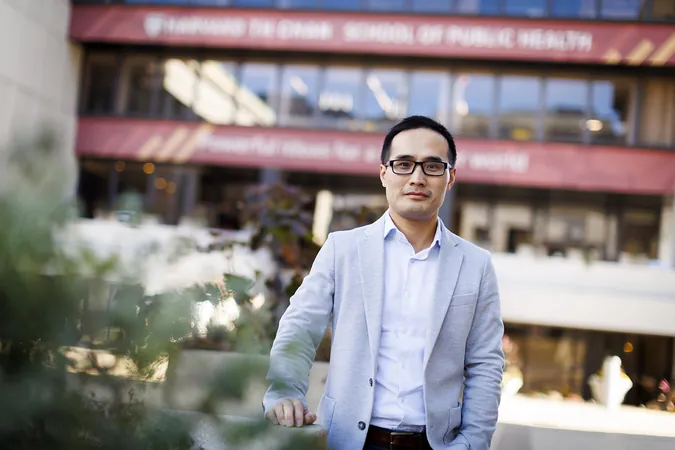
New Study Challenges Current Colonoscopy Guidelines Amid Rising Colorectal Cancer Rates
2024-12-17
Author: Daniel
Introduction
A groundbreaking new study reveals that adults with a clean bill of health from their first colonoscopy may not require a follow-up for a significantly longer period than the currently recommended 10 years. This finding comes at a crucial time as colorectal cancer rates surge, particularly among younger individuals, causing considerable concern among health experts.
Colorectal Cancer Statistics
Colorectal cancer has solidified its grim position as the second-deadliest cancer in the United States after lung cancer, projected to claim approximately 52,550 lives in 2023 alone. While rates have seen a decline among older adults, alarming trends indicate that cases among those aged 40 to 49 increased by 15% from 2000 to 2026. Though the reasons behind this concerning spike remain unclear, the U.S. Preventive Services Task Force reacted by lowering the recommended age for the first screening from 50 to 45, urging individuals with average risk to undergo screening every decade thereafter.
Impact on Medical Facilities
Dr. Mingyang Song of the Harvard T.H. Chan School of Public Health expressed that the surge in screenings, especially with the new age recommendations, has led to overwhelmed medical facilities and extended wait times for appointments. 'The clinic is getting hit hard; it was already strained, and the situation is now even more dire,' remarked Song, who is also associated with Harvard Medical School.
Study Details and Findings
Published last month in JAMA Oncology, the study assessed screening results and cancer incidence from a substantial cohort of 195,453 participants across three long-term studies: the Nurses’ Health Study, Nurses’ Health Study II, and the Health Professionals Followup Study. The research investigated the outcomes of two distinct groups: those who achieved negative results in their initial screenings—indicating no polyps or cancer—and those who had yet to be screened.
Findings revealed a significantly lower risk of developing colorectal cancer among individuals with negative screening results compared to their unscreened counterparts. Further analysis categorized the negative screening group based on lifestyle-related risk factors. This portion of the study was partially funded by the National Institutes of Health.
Risk Assessment Based on Lifestyle
The analysis indicated that it could take an average of 16 years for individuals with intermediate-risk lifestyles and a negative screening to reach the same incidence of colorectal cancer as the unscreened group over 10 years. In contrast, those leading low-risk lifestyles, characterized by healthy diets and regular exercise, could take as long as 25 years to match that incidence rate following a negative screening.
Personalized Screening Recommendations
Dr. Song advocates that cancer screenings should be personalized and thoroughly discussed between healthcare providers and patients. Although any changes to national screening guidelines may require further evidence, this study suggests that individuals with negative screening results could potentially extend their screening intervals beyond the standard recommendation of 10 years, and possibly up to 20 years for those maintaining a low-risk lifestyle.
Equitable Access to Screening
This tailored approach seeks to optimize healthcare resources, ensuring that those unlikely to benefit from repeated colonoscopies are spared unnecessary procedures, while focusing on those who have never been screened. Strikingly, about 30% of eligible U.S. adults remain unscreened, with significant disparities evident among disadvantaged populations where screening rates historically lag behind those of more advantaged groups.
'What we’re observing is a concerning trend where individuals from more privileged backgrounds are more likely to receive colonoscopies, while disadvantaged populations, who are at greater risk for colorectal cancer, receive less frequent screenings,' stated Dr. Song. His study aims to address this gap and improve the equitable delivery of colonoscopy services on a larger scale, ensuring timely and effective cancer prevention strategies for all demographics.
Conclusion
Could this pivotal research lead to a major overhaul in colonoscopy protocols? Stay tuned as the conversation around colorectal health continues to evolve!


 Brasil (PT)
Brasil (PT)
 Canada (EN)
Canada (EN)
 Chile (ES)
Chile (ES)
 Česko (CS)
Česko (CS)
 대한민국 (KO)
대한민국 (KO)
 España (ES)
España (ES)
 France (FR)
France (FR)
 Hong Kong (EN)
Hong Kong (EN)
 Italia (IT)
Italia (IT)
 日本 (JA)
日本 (JA)
 Magyarország (HU)
Magyarország (HU)
 Norge (NO)
Norge (NO)
 Polska (PL)
Polska (PL)
 Schweiz (DE)
Schweiz (DE)
 Singapore (EN)
Singapore (EN)
 Sverige (SV)
Sverige (SV)
 Suomi (FI)
Suomi (FI)
 Türkiye (TR)
Türkiye (TR)
 الإمارات العربية المتحدة (AR)
الإمارات العربية المتحدة (AR)